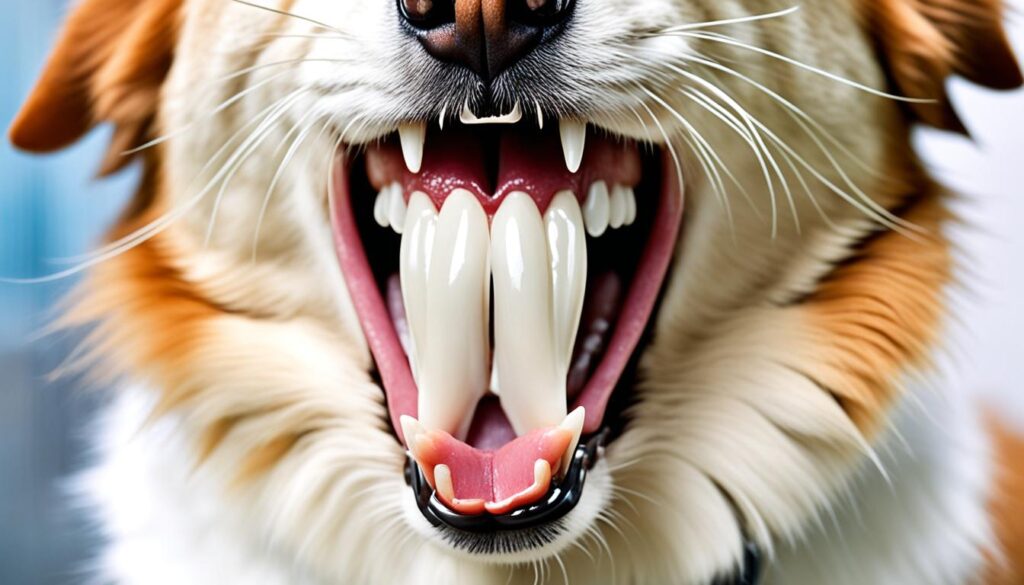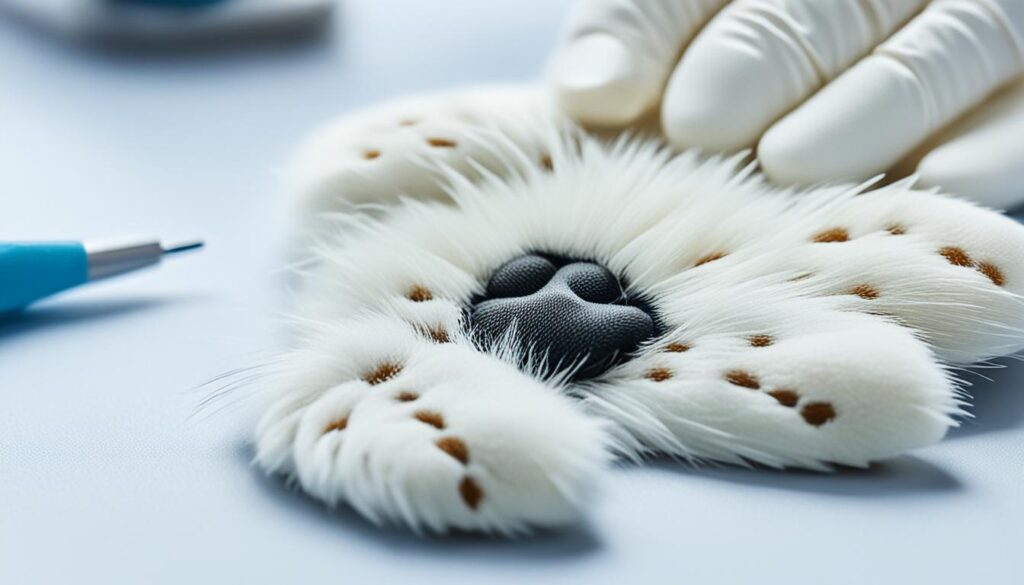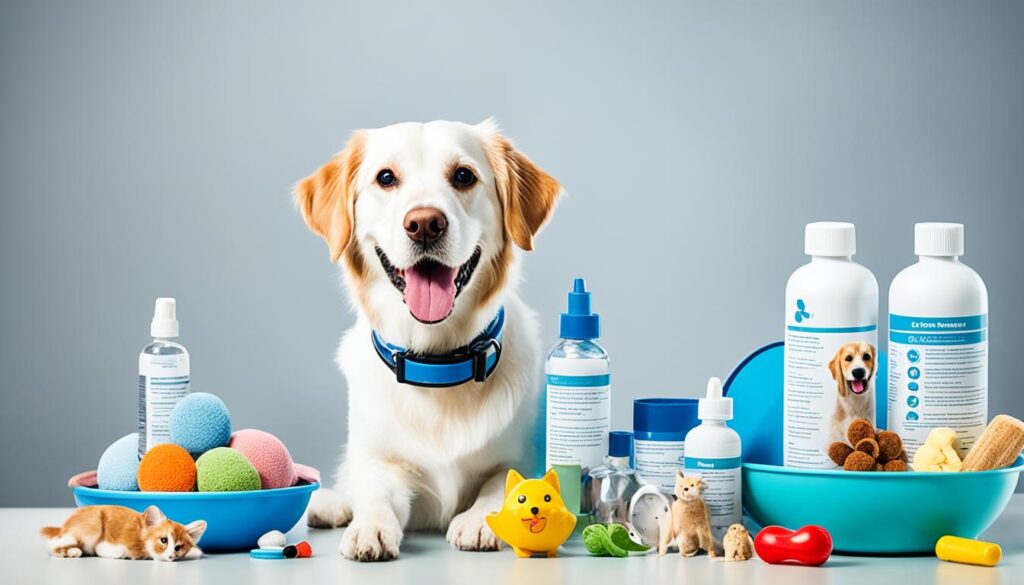At [Brand Name], we understand the importance of maintaining your pet’s health and well-being. Preventive care is essential for avoiding common health problems and ensuring a long and happy life for your furry friend. By providing proper care, you can proactively prevent costly health issues in the future.
Regular vet check-ups, vaccinations, a balanced diet, regular exercise, dental care, and parasite prevention are some of the key aspects of preventive pet care. By following these pet health and wellness tips, you can ensure that your pet stays healthy and happy for years to come.
Key Takeaways:
- Regular vet check-ups are crucial for monitoring your pet’s health and preventing potential issues.
- Vaccinations help protect your pet from various diseases.
- A balanced diet provides the necessary nutrition for your pet’s overall health.
- Regular exercise keeps your pet physically and mentally stimulated.
- Dental care and parasite prevention are essential for maintaining your pet’s well-being.
The Costly Consequences of Pet Health Neglect
Neglecting your pet’s health can have serious consequences, both for their well-being and your wallet. When preventive care is not prioritized, common health issues can escalate into more serious conditions that require expensive treatments. For example, heartworm disease, which can be prevented with medication, can lead to costly treatment options such as chest X-rays, echocardiograms, and injections. Similarly, dental disease can progress and cause infections that may require extensive dental cleanings or even surgery. By neglecting your pet’s health, you not only put their well-being at risk but also incur higher healthcare costs in the long run.
It’s important to remember that preventive care is not only about ensuring your pet’s current health but also about avoiding potential health complications that can arise in the future. By investing in regular check-ups, vaccinations, and wellness screenings, you can catch any underlying health issues early and address them before they become more severe and expensive to treat.
Not only can neglecting your pet’s health lead to higher healthcare costs, but it can also diminish their quality of life. Untreated health problems can cause discomfort, pain, and a decline in overall well-being for your furry friend. It’s our responsibility as pet owners to provide the care they need to thrive.
Furthermore, neglecting your pet’s health can also have emotional consequences. Seeing your pet suffer due to preventable health conditions can be distressing and can impact the bond between you and your pet. By prioritizing their health and well-being, you can ensure a happier and more fulfilling relationship.
By investing in preventive pet care and prioritizing your pet’s health, you can avoid the costly consequences of pet health neglect. Not only will you save money on potential expensive treatments, but you will also enhance your pet’s quality of life and enjoy more precious years together.
Comprehensive Dental Care: The Foundation of Pet Wellness
Dental care is a critical component of overall pet health and wellness. Just like humans, pets can suffer from dental issues that can lead to discomfort, pain, and serious health complications if left untreated. By prioritizing pet dental care, you can help ensure that your furry friend maintains a healthy mouth and avoids dental disease.
Daily or Weekly Tooth Brushing
One of the most effective ways to prevent dental disease in pets is through regular tooth brushing. Ideally, you should brush your pet’s teeth daily or at least once a week. Use a pet-friendly toothbrush and toothpaste to gently brush their teeth and gums. This helps remove plaque and tartar buildup, which can lead to tooth decay and gum disease. Regular tooth brushing also freshens your pet’s breath and promotes overall oral hygiene.
The Role of Dental Treats and Water Additives
In addition to tooth brushing, dental treats and water additives can provide supplementary defense against dental disease. Dental treats are specially formulated to help clean your pet’s teeth as they chew. They can help reduce plaque and tartar buildup and freshen breath. Water additives are another option that can aid in maintaining good oral hygiene. These additives are mixed with your pet’s drinking water and work to fight plaque and tartar as your pet drinks.

Importance of Yearly Dental Cleanings
Despite regular tooth brushing and the use of dental treats and water additives, some plaque and tartar may still accumulate on your pet’s teeth. This can lead to dental disease, including periodontal disease, which can cause pain, tooth loss, and infection. To address this, it is crucial to schedule yearly dental cleanings performed by a veterinarian. During these cleanings, your vet will thoroughly examine your pet’s oral health and remove stubborn plaque and tartar that cannot be eliminated through home care alone. These cleanings are typically done under anesthesia to ensure a safe and stress-free experience for your pet.
By prioritizing comprehensive dental care consisting of regular tooth brushing, dental treats and water additives, and yearly dental cleanings, you can help prevent dental disease and promote your pet’s overall health and wellness. Remember, a healthy mouth is the foundation of a healthy pet!
Owning a Healthy Weight: Avoiding Pet Obesity
Pet obesity is a growing problem that can negatively impact your pet’s health and lifespan. It can lead to a range of health issues, including arthritis, heart disease, diabetes, and respiratory problems. To avoid pet obesity, it is important to provide your pet with a balanced and nutritious diet. Avoid overfeeding and monitor their calorie intake based on their specific needs. Regular exercise is also crucial for maintaining a healthy weight. Engage in physical activities and playtime with your pet to keep them active and mentally stimulated. By promoting a healthy weight, you can prevent various obesity-related health problems in your pet.
| Consequences of Pet Obesity | Prevention and Management |
|---|---|
| Arthritis | Provide a balanced and nutritious diet |
| Heart disease | Avoid overfeeding and monitor calorie intake |
| Diabetes | Engage in regular exercise and playtime |
| Respiratory problems | Promote a healthy weight for your pet |
Managing Pet Allergies for Optimal Health
Pet allergies can cause discomfort and have a significant impact on your pet’s overall health. It is crucial to recognize the signs of allergic reactions in order to provide timely care and management. Common signs of pet allergies include excessive scratching, licking, sneezing, and redness of the skin.
Recognizing Signs of Allergic Reactions
If you notice any of these symptoms in your pet, it is advisable to seek veterinary care. The sooner you address the allergies, the better you can manage them and prevent further complications. Your veterinarian can help determine if your pet is indeed experiencing allergic reactions and identify the specific allergens triggering the symptoms.
Benefit of Allergy Testing and Custom Treatment Plans
Allergy testing plays a crucial role in managing pet allergies effectively. By identifying the specific allergens, such as pollen, dust mites, or certain food ingredients, you can take targeted steps to reduce exposure to these triggers. Once the allergens are identified, your veterinarian can develop a custom treatment plan tailored to your pet’s needs.
This may involve various approaches, including allergy shots, antihistamines, or dietary changes. Allergy shots, also known as immunotherapy, gradually expose your pet to the allergens in order to build up tolerance over time. Antihistamines can help alleviate the symptoms of allergic reactions. In some cases, dietary changes may be necessary to avoid allergenic ingredients that cause adverse reactions in your pet.
By effectively managing your pet’s allergies, you can improve their quality of life and minimize the risk of secondary health complications. Work closely with your veterinarian to develop a comprehensive approach that addresses your pet’s specific allergies and individual needs.

Note: The image above visually represents the importance of pet allergy testing in diagnosing and managing pet allergies.
Pet Health and Wellness Tips: Preventing Arthritis Through Care
Arthritis is a common health issue in pets, especially as they age. However, there are several preventive measures that can help reduce the risk and manage the symptoms of arthritis. By taking proactive steps to care for your pet’s joint health, you can ensure their overall well-being and mobility.
Weight Management and Joint Supplements
Weight management plays a crucial role in preventing and managing arthritis in pets. Excess weight puts additional stress on joints, leading to increased discomfort and inflammation. Consult with your veterinarian to determine the ideal weight for your pet based on their breed, size, and age. Together, you can develop a balanced diet and portion control plan tailored to your pet’s specific needs.
In addition to weight management, joint supplements can provide support for your pet’s joint health. These supplements, recommended by your vet, often contain ingredients like glucosamine and chondroitin that promote cartilage health and reduce inflammation. Incorporating joint supplements into your pet’s daily routine can help maintain joint function and reduce the risk of arthritis.
Pain Management Techniques for Comfort
If your pet already has arthritis, pain management is crucial for their comfort and quality of life. Your veterinarian can recommend appropriate pain medication or therapies that can help alleviate discomfort. Non-steroidal anti-inflammatory drugs (NSAIDs) are commonly prescribed to control pain and reduce inflammation in arthritic pets. However, it’s important to consult with your vet before administering any medication to ensure the appropriate dosage and suitability for your pet.
In addition to medication, physical therapy and alternative treatments can also provide pain relief for pets with arthritis. Techniques such as acupuncture, cold laser therapy, and hydrotherapy can help reduce pain, improve mobility, and increase blood circulation to affected joints.
Low-Impact Exercises and Their Advantages
Regular exercise is essential for maintaining your pet’s overall health and well-being. For pets with arthritis, low-impact exercises are particularly beneficial as they minimize stress on joints while still providing necessary physical activity. These exercises help improve muscle strength, flexibility, and joint mobility without exacerbating pain or causing further damage.
Some examples of low-impact exercises for pets with arthritis include:
- Gentle walks on flat surfaces – Avoid uneven terrain or long hikes that can strain joints.
- Swimming – The buoyancy of water reduces pressure on joints, making it an excellent low-impact exercise option.
- Slow and controlled movements – Incorporate exercises that promote joint range of motion without causing discomfort, such as controlled stretching or simple obstacle courses.
These exercises not only help maintain joint function but also provide mental stimulation and strengthen the bond between you and your pet.
By incorporating weight management, joint supplements, pain management techniques, and low-impact exercises into your pet’s care routine, you can promote joint health, prevent the onset or progression of arthritis, and improve their overall quality of life. Remember, always consult with your veterinarian for personalized advice and recommendations based on your pet’s specific needs.
Confronting Parasites with Preventive Measures
Parasites, such as fleas, ticks, and heartworms, can significantly impact your pet’s health. Preventive measures are crucial for protecting your pet from these parasites. Regular use of flea and tick prevention products is essential to prevent infestations and the diseases they can transmit. Heartworm prevention medication should also be administered year-round to safeguard your pet against this potentially life-threatening parasite. Your veterinarian can recommend the most suitable preventive products for your pet and provide guidance on proper usage. By confronting parasites with preventive measures, you can ensure your pet’s well-being and minimize the risk of parasite-borne diseases.
Note: Image shows a pet flea comb, highlighting the importance of flea prevention.
Nutrition and Exercise: Foundation of Holistic Pet Care
In order to provide holistic care for your pet, it is essential to prioritize both nutrition and exercise. A balanced diet and regular physical activity are key components of maintaining your pet’s overall health and well-being. By focusing on pet nutrition and exercise, you can ensure that your furry friend leads a happy and healthy life.
The Importance of a Balanced Diet for Pets
A balanced diet is crucial for meeting your pet’s nutritional needs and promoting optimal health. Consult with your veterinarian to determine the appropriate diet for your pet, taking into consideration factors such as their age, breed, and any specific health conditions they may have. A well-rounded and nutritious diet provides the essential nutrients, vitamins, and minerals that support your pet’s growth, energy levels, and immune system.
Feeding your pet high-quality pet food that is specifically formulated for their life stage and size is a great starting point. Avoid feeding them human food or table scraps, as these can be detrimental to their health. Additionally, ensure that your pet has access to fresh water at all times, as proper hydration is essential for their overall well-being.

Creating an Effective Exercise Routine for Your Pet
Regular exercise is vital for keeping your pet physically and mentally stimulated. It helps maintain a healthy weight, promotes cardiovascular fitness, strengthens muscles and bones, and prevents behavioral issues related to boredom and excess energy. By creating an effective exercise routine, you can cater to your pet’s individual needs and ensure they have a well-rounded and fulfilling lifestyle.
Start by considering your pet’s energy levels, age, and physical abilities. Dogs, for example, may benefit from daily walks, runs, or playtime in a fenced yard. Cats, on the other hand, can enjoy interactive toys, scratching posts, and vertical spaces for climbing. Be sure to incorporate a variety of activities to engage different senses and keep your pet’s interest piqued.
Remember to gradually increase the intensity and duration of exercise to avoid overexertion or injuries. Also, be mindful of weather conditions and adjust your activities accordingly. For example, on hot days, opt for shorter walks during cooler times of the day to prevent overheating.
Ultimately, a well-balanced diet and regular exercise are the foundations of holistic pet care. By providing proper nutrition and engaging your pet in regular physical activity, you can support their overall health and well-being. Consult with your veterinarian for personalized recommendations and guidance to ensure that your pet’s nutritional and exercise needs are met.
Understanding and Acting on Preventive Healthcare Guidelines
Preventive healthcare guidelines provide valuable recommendations for keeping your pet healthy. By following these guidelines, you can proactively protect your pet’s well-being and prevent potential health issues from arising. Two important aspects of preventive healthcare for pets are regular vet examinations and early testing and diagnosis.
The Critical Role of Regular Vet Examinations
Regular vet check-ups are essential for monitoring your pet’s overall health and detecting any potential issues early on. During these examinations, your veterinarian can assess your pet’s condition, administer necessary vaccinations, and perform screenings for diseases. These check-ups allow for the early detection of any health concerns, enabling prompt intervention and treatment.
By scheduling regular vet examinations, you ensure that your pet receives the necessary preventive care and any potential health issues are addressed in a timely manner. Your veterinarian can provide personalized recommendations based on your pet’s age, breed, and specific needs, helping to keep your pet healthy and happy.
The Importance of Early Testing and Diagnosis
Early testing and diagnosis play a vital role in preventive healthcare for pets. By identifying potential health conditions at an early stage, treatment can be initiated promptly, leading to better outcomes and preventing the progression of diseases.
Your veterinarian may recommend various tests and screenings based on your pet’s age, breed, and overall health. These may include blood work, urine analysis, imaging studies, or specific disease screenings. Early testing can reveal underlying health issues that may not be apparent during regular examinations, allowing for timely intervention and treatment.
Early diagnosis is particularly crucial for diseases that may not exhibit obvious symptoms in their early stages. Conditions such as heart disease, kidney disease, and certain types of cancer can be detected early through appropriate testing, increasing the chances of successful treatment and improving your pet’s quality of life.
By understanding and acting on preventive healthcare guidelines, you can take proactive measures to safeguard your pet’s health and well-being. Regular vet examinations and early testing and diagnosis are key components of preventive care, ensuring that any potential health issues are identified and addressed promptly. By prioritizing preventive healthcare for your pet, you can provide them with the best possible care and help them lead a long, healthy, and happy life.

Conclusion
Proper care and preventive measures are essential for ensuring your pet’s health and wellness. By implementing the tips and strategies discussed in this article, you can significantly reduce the risk of common pet health problems and promote a long and healthy life for your furry friend.
Remember to prioritize regular vet check-ups to monitor your pet’s overall health and catch any potential issues early. Providing your pet with a balanced diet and regular exercise will contribute to their overall well-being and help prevent weight-related health problems. Additionally, proper dental care, including regular brushing and annual cleanings, is crucial for maintaining good oral hygiene and preventing dental disease.
Don’t forget about parasite prevention. Protect your pet from fleas, ticks, and heartworms by using preventative products recommended by your veterinarian. By doing so, you can minimize the risk of parasite-related diseases and keep your pet healthy.
Finally, early testing and diagnosis are critical for identifying and treating any health issues as soon as possible. By taking a proactive approach to your pet’s healthcare, you can provide the best possible care and enjoy many happy and healthy years together. Remember, your pet’s health and wellness should always be a top priority!
FAQ
What are some pet health and wellness tips?
Some pet health and wellness tips include regular vet check-ups, vaccinations, providing a balanced diet, regular exercise, dental care, and parasite prevention.
Why is preventive care important for my pet?
Preventive care is important for maintaining your pet’s health and avoiding common health problems. It helps prevent costly health issues in the long run and ensures your pet lives a long and healthy life.
How can neglecting my pet’s health impact them and my wallet?
Neglecting your pet’s health can lead to serious health consequences and incur higher healthcare costs. Common health issues can escalate into more serious conditions that require expensive treatments.
Why is dental care important for my pet?
Dental care plays a crucial role in maintaining your pet’s overall health. Regular tooth brushing, dental treats, water additives, and yearly dental cleanings are key aspects of dental care that help prevent dental disease and associated health complications.
How can I prevent pet obesity?
To prevent pet obesity, provide a balanced and nutritious diet, avoid overfeeding, and monitor their calorie intake. Regular exercise is also crucial for maintaining a healthy weight.
How can I manage my pet’s allergies?
If you suspect your pet has allergies, seek veterinary care. Allergy testing can help identify the specific allergens, and a custom treatment plan can be developed. This may include allergy shots, antihistamines, or dietary changes.
What can I do to prevent and manage arthritis in my pet?
To prevent and manage arthritis, focus on weight management, provide joint supplements recommended by your vet, use pain management techniques, and engage in low-impact exercises.
How can I protect my pet from parasites?
Regular use of flea and tick prevention products and year-round heartworm prevention medication are essential for protecting your pet from parasites and the diseases they can transmit.
How important is nutrition and exercise for my pet’s overall wellness?
Nutrition and exercise are essential components of holistic pet care. Consult with your vet to determine the appropriate diet and create an exercise routine to keep your pet physically and mentally stimulated.
Why should I follow preventive healthcare guidelines for my pet?
Regular vet examinations and early testing and diagnosis play a critical role in monitoring your pet’s health, detecting potential issues, and ensuring prompt treatment and prevention of serious health conditions.
Source Links
- https://www.sbahvet.com/blog/common-pet-health-issues-and-how-to-prevent-them-a-guide-for-pet-owners/
- https://vcahospitals.com/know-your-pet/preventive-health-care-guidelines-for-dogs
- https://www.marketplaceveterinary.com/blog/common-pet-health-issues-and-how-to-prevent-them-a-guide-for-pet-owners/

